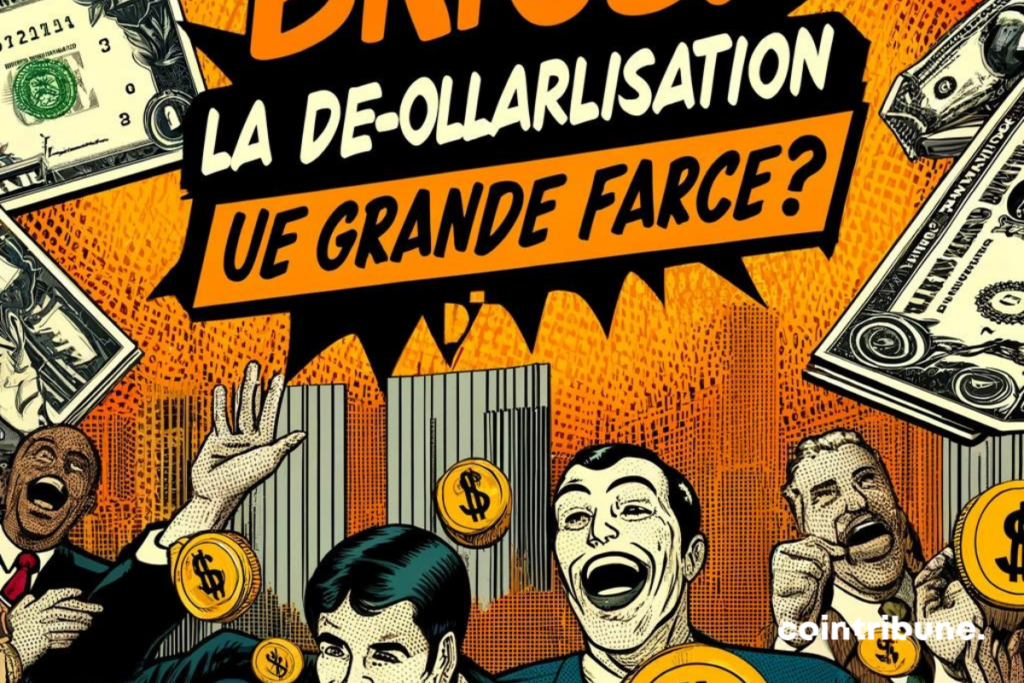BRICS: Is de-dollarization a big joke?
De-dollarization, a recurring concept in economic discussions, sparks a lively debate. While some view this movement led by the BRICS as an imminent threat to the dominance of the US dollar, prominent experts dismiss this notion as unfounded. This article explores why the idea of de-dollarization is considered a “big farce” according to some experts.

BRICS De-dollarization Movement: Jeffery Christian’s Position
Jeffery Christian, a recognized expert in the gold and silver markets, recently labeled de-dollarization as a “myth, joke, and nonsense.” According to him, the US dollar continues to dominate international trade, representing 88% of global transactions. The expert explains that the stability and liquidity of the dollar make it a preferred currency for global transactions. He emphasizes that despite the growing discussions around the concept of de-dollarization, the entire world uses the US currency and “no one is throwing money away.”
Jeffery Christian notes that while there has been a diversification of central bank currency holdings, this “has not come at the expense of the dollar, and it does not deviate from the dollar.” He supports his arguments with data showing that dollar transactions remain largely preferred due to the trust they inspire in investors and governments. Attempts to diversify into other currencies, such as the yuan or cryptocurrencies, have not reached a significant level to challenge the supremacy of the dollar according to him.
Morgan Stanley Experts Weigh In
James Lord of Morgan Stanley shares a similar analysis to that of Jeffery Christian. According to him, the concept of de-dollarization, often associated with the rise of cryptocurrencies like bitcoin, is largely overestimated. The US dollar is unbeatable and is destined to remain the dominant currency in the long term. The expert highlights that during periods of recession or global stock market downturns, investors prefer to turn to the dollar due to its historical stability. This preference for the dollar further strengthens its central position in the global economy.
Furthermore, Lord reiterates that the dollar’s competitors, such as the yuan and bitcoin, are not robust enough to rival its supremacy. He mentions that the volatility of cryptocurrencies limits their utility as a stable store of value. For example, a cryptocurrency that rapidly increases in value is often kept for appreciation rather than for ordinary transactions. David Adams of Morgan Stanley emphasizes that the best outcome for a dominant currency is stability, a characteristic that the dollar continues to demonstrate.
The experts therefore believe that the dollar will retain its strong position. According to these specialists, despite the discussions on de-dollarization and despite the multiple BRICS initiatives, the dollar remains and will remain the dominant currency in the long term, thanks to its historical stability and reliability.
Maximize your Cointribune experience with our "Read to Earn" program! For every article you read, earn points and access exclusive rewards. Sign up now and start earning benefits.
Diplômé de Sciences Po Toulouse et titulaire d'une certification consultant blockchain délivrée par Alyra, j'ai rejoint l'aventure Cointribune en 2019. Convaincu du potentiel de la blockchain pour transformer de nombreux secteurs de l'économie, j'ai pris l'engagement de sensibiliser et d'informer le grand public sur cet écosystème en constante évolution. Mon objectif est de permettre à chacun de mieux comprendre la blockchain et de saisir les opportunités qu'elle offre. Je m'efforce chaque jour de fournir une analyse objective de l'actualité, de décrypter les tendances du marché, de relayer les dernières innovations technologiques et de mettre en perspective les enjeux économiques et sociétaux de cette révolution en marche.
The views, thoughts, and opinions expressed in this article belong solely to the author, and should not be taken as investment advice. Do your own research before taking any investment decisions.